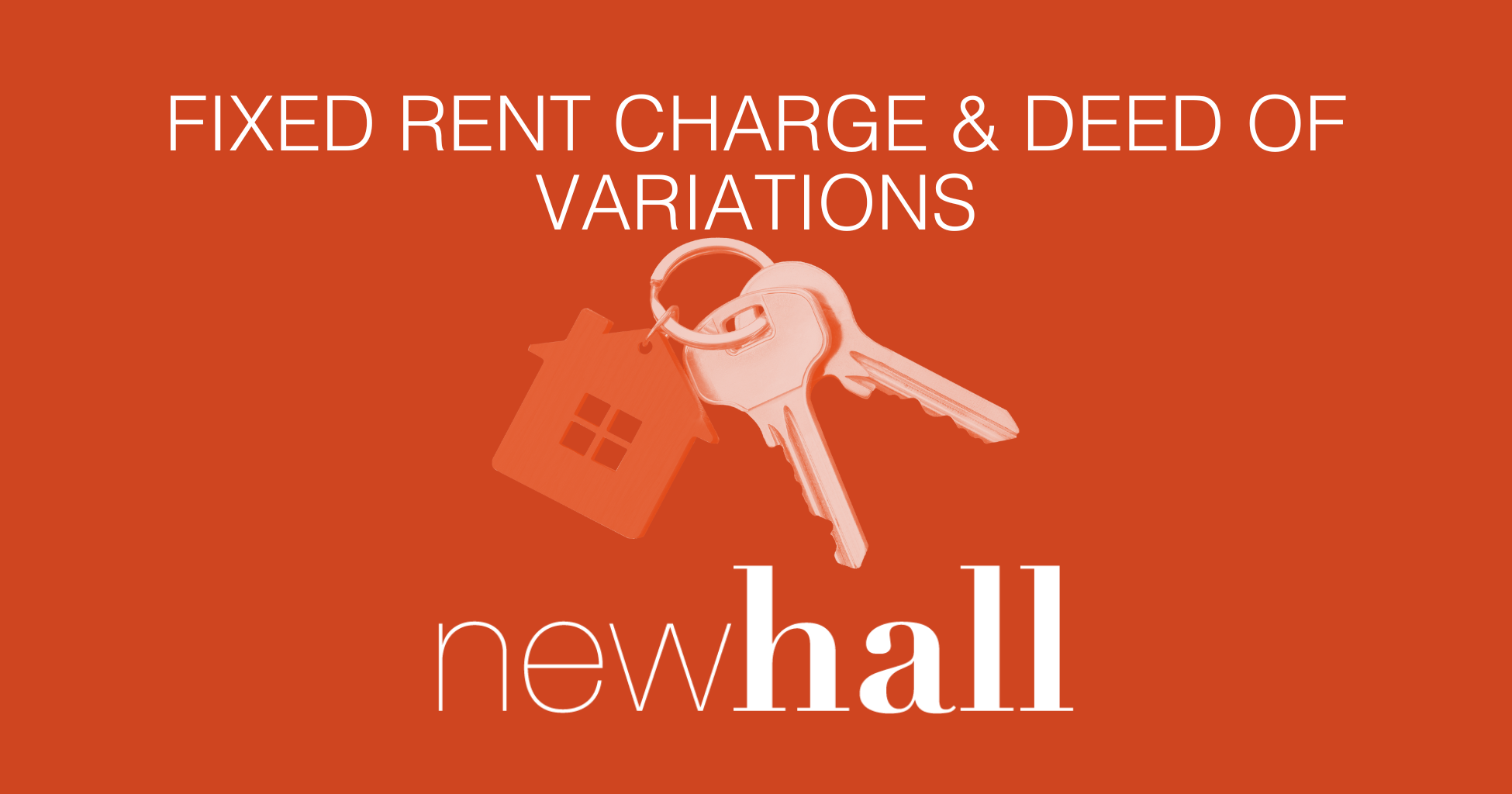The following points are intended to give guidance to residents in relation to Covenants and Fixed Rentcharge.
Estate Rentcharge
Q: What is a rentcharge?
A: A rentcharge is an obligation to pay rent which binds the owner of a freehold property to certain obligations and restrictions. There are two forms of rentcharge. A fixed rentcharge provides the owner of the rentcharge with an income. In this case the income is nominal. A variable rentcharge is a form of service charge applicable to freehold owners.
Q: Why are the restrictions important and why have they been included?
A: You will be aware that Newhall is a high-quality development with a unique character. The development has been designed with thought and care and all phases have been subject to rigorous design controls at construction stage. The covenants contained in your legal documentation are there to protect the wider estate from instances where individuals seek to change their property or act in a certain manner which would affect the amenity and enjoyment of others. As such it is important that these covenants are adhered to.
Q: Why does this need to be addressed at the sale of my home?
A: As the obligation to make contributions towards the maintenance and services provided in relation to the common areas of the estate is a positive one, it does not automatically pass on to future owners of the properties when properties are sold. We therefore ensure that the obligation to pay a share of the estate charges passes on to a new owner of a property by imposing an Estate Rentcharge. This means that each new owner of a property must enter into a Deed of Covenant and Rentcharge with us to confirm that they will pay the estate charge and comply with covenants during their ownership. It is important for the benefit of all the estate and all residents.
Q: Is this document standard?
A: There is no one uniform form of wording as this has varied over time. Some of the deeds of Covenant are in favour of Newhall Projects Ltd “NPL” because they still own the land until it can be transferred to Newhall Residents Association “NRA”.
Q: Where can I find the Rent Charge?
A: Sometimes the Fixed Rentcharge is included in a transfer agreement related to your home, in others it lies in a separate Deed of Covenant and Rentcharge. Each of these documents vary per phase so one clause reference on one phase may be different to another phase. As such each resident or their solicitor should review their own legal documents (contract, transfer, lease, deed of covenant and rentcharge) to understand the position in relation to their own home.
At the time of your purchase, your solicitor should have explained the implications of these documents.
Q: Why are there Fixed and Variable charges?
A: The Fixed rentcharge is different to a variable estate service charge which is for the maintenance and upkeep of all communal public realm areas that benefit the Newhall Estate. The Fixed rentcharge documentation will confirm if the rent charge should be paid, whether formally demanded or not. A rentcharge owner is entitled to recover any sums properly due but does not necessarily need to raise an invoice to demand the payment.
Q: Why has Newhall elected to charge this Fixed Rentcharge now?
A: These nominal sums have not been charged to date at the election of Newhall, but we have decided that they will be charged as per the agreements. To save administration and fees for SHW these have been included as part of the same invoice for the variable service charge. If you have not been charged this before, or if you have not paid this if you have been invoiced, this does not mean that the other obligations and restrictions in your transfer or Deed of Covenant and Rentcharge do not apply.
Q: What happens if I have not paid?
A: There is concern from some Residents that NPL / NRA may take possession of their home if the nominal Fixed Rentcharge has not been invoiced and / or has not been paid. It is correct to say that in the documents for properties on the estate, enforcement powers are included under s121 of the Law of Property Act, whereby possession of the property can be sought for non-payment. Under s121 Law of Property Act 1925, a rentcharge owner has access to substantial remedies if the rentcharge is not paid within 40 days of the due date. The rentcharge owner is entitled to possession of the property – a form of forfeiture – and can also impose a statutory lease over the property and take the income from the lease. NPL / NRA is aware of case law in this regard and some unfair practices by others and wishes to assure residents that this is not the intention at Newhall.
This enforcement power may be considered by NPL / NRA in the unlikely event that the estate charge remains unpaid for a considerable time and where we raised an invoice and allowed a reasonable time for any arrears to be paid. However, we are aware that this remedy may not be accepted by some lenders.
The simplest way to avoid this eventuality is to pay the nominal Fixed Rentcharge.
Q: Were Rent Charges abolished?
A: Since 22 August 1977 the creation of most types of rentcharge has been prohibited. The main class of rentcharge excepted from the general prohibition is known as an estate rentcharge.
This can be a rentcharge of either:
- a nominal amount for the purpose of making covenants to be performed by the landowner enforceable by the rentowner against the current owner of the land;
- a reasonable amount to meet or contribute towards the cost of the performance by the rentowner of covenants for the provision of services, maintenance or repair and insurance and other payments for the benefit of the land affected by the rentcharge.
The Newhall estate rentcharge falls within the exception and remains in force,
How we can help you?
Deed of Variation / Supplemental Deed of Covenant.
- Where your mortgage lender requires a Deed of Variation to provide a notice provision before NPL / NRA seeks remedies for non-payment, we will agree to provide this Deed of Variation via Tees in all cases. If residents wish to seek a Deed of Variation in any event, we will agree to do this as long as NPL / NRA’s legal costs are met.
- As far as Newhall Projects is aware there have been 38 such requests to date and we now have over 1,500 occupations across Newhall.
- NPL / NRA are willing to offer a Supplemental Deed of Covenant or Deed of Variation to vary the provisions to confirm that subsection (4) of S121 is not available to the Residents Association for enforcement and, instead to use subsection (3) where prior notice will be given to any lender (correctly notified to us) is given before such enforcement action is taken. Please contact us if you require further information on this. This enables the mortgage lender to pay any unpaid rentcharge to protect their position if the resident has refused to do so.
- Not every lender who requires a change asks for the same changes. As such there is not a standard Deed of Variation and as stated earlier there is not a standard suite of documents as they vary from phase to phase and over time. In terms of fees NPL / NRA does not seek a fee for itself for its staff time. NPL / NRA is currently represented in such matters by Tees Law and their current charge is £375 plus VAT per Deed of Variation.
- Also, there are other elements when dealing with the variations such as receipting Notice of Transfer and Charge, providing certificates for the restriction on the title on behalf of NRA, Deeds of Covenant etc. These all attract a fee. If your solicitor requires a Certificate to comply with a restriction Tees charge is £50.00 plus VAT. This is purely to recognise their time to agree or provide the relevant document.
- Sometimes one of the old land registry restrictions remains on the title where a buyer’s solicitors did not apply to have it removed. If this is the case, Tees offer to provide a form to remove it for a cost of £150.00 plus VAT.
- It is not possible to provide a blanket deed of variation and given the number of occupations it is not practical to provide all properties such a Deed of Variation as this is not required by all lenders, and if you pay your nominal Fixed Rentcharge then there is no need for a Deed of Variation. As stated above, where your mortgage lender does require this, or where you request this, we are happy to oblige as long as NPL / NRA’s reasonable legal costs are paid as above.
If you have further questions or need advice, please contact: Zack Jermy, Senior Property Manager at: zjermy@shw.co.uk or Dominic Brownlee at: newhallestate@shw.co.uk and they will answer or direct your enquiry.
- First published: 12th April, 2024


Newhall please confirm was this written by Tees Law or by someone else? There are many serious inaccuracies within and is very concerning and misleading. It does support further that Newhall are at the root of misleading info. Please confirm this so we are setting expectations with residents properly.
Thank you for your comment – Newhall Projects Ltd invites you to state what is misleading and why based on legal advice and in writing from a Solicitor. Please send this to: zjermy@shw.co.uk. Thank you.